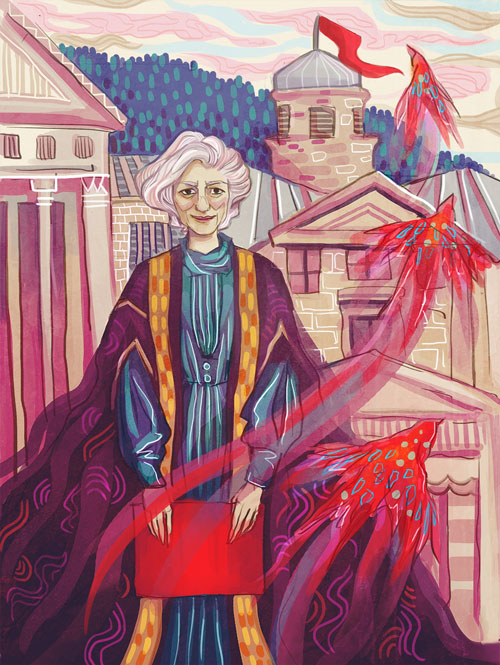Hundreds of people gathered at the Church of Saint-Léon-de-Westmount on Sept. 16 to honour the life and accomplishments of Gretta Chambers, former McGill Chancellor and beloved journalist, political commentator, and community builder. Chambers passed away on Sept. 9 at St. Mary’s Hospital in Montreal due to a serious heart condition.
Born on Jan. 15, 1927 to an anglophone father and francophone mother, Chambers spent much of her life and career bridging the gap between the two major linguistic and cultural communities in Quebec.
“She was the whole package in terms of her deep understanding of national and international environment as well as politics and policies,” Sylvia Martin-Laforge, director general of the Quebec Community Group News (QCGN), said. “She was an educator in the most holistic way. She’d help us to see and help us understand.”
Chambers’ career was largely centered around communicating challenging political topics to broad audiences. She started contributing a weekly column on Quebec politics to the Montreal Gazette in 1977. Chambers used her talent for writing to explain complex political issues to her readers. By the early 2000s, she had written more than 800 articles for the Gazette.
From 1977 to 1980, Chambers also hosted a television program called The Editors on Canada’s First Canada’s Finest (CFCF) 12, now CTV, on which she led political discussions. As one of few women in journalism at the time, Chambers was a trailblazer.
“I would say that one of her legacies was really helping establish women as highly credible analysts and laying the groundwork for other female journalists,” Lucinda Chodan, editor of the Montreal Gazette, said.
In 1993, she was honoured as an Officer of the National Order of Quebec for her work in connecting the anglophone and francophone communities in Quebec. The following year, her talent and service to Canada and humanity earned her a spot as a Member of the Order of Canada, and was promoted to Companion in 2000. In 2012, the Quebec Community Groups Network (QCGN) awarded Chambers with the Goldbloom Award for her distinguished community service.
Beyond the vital role she played in the greater Montreal community, Chambers was well-known at McGill in particular. She graduated from McGill with a B.A. in Political Science in 1947—at only 20 years old—and was an influential figure on campus up until her death. She became a Governor of McGill in 1978—emeritus since 1988—and was its first female Chancellor.
Chambers was involved with McGill institutions including the Montreal Consortium of Human Rights and Advocacy Training (MCHRAT), which was created in a collaboration between the McGill School of Social Work and Faculty of Law. She was crucial to the work of the McGill Middle East Program in Civil Society and Peace-Building (MMEP), now the International Community Action Network (ICAN). These groups have created 11 human rights-based community centres in Palestine, Jordan, and Israel, which provide services such as education, housing, and legal aid to people who are affected by war, poverty, or instability.
“She was instrumental in representing not just what our ideas are and our values, but instrumental as a person,” James Torczyner, Founder of the MCHRAT and the MMEP, said. “At one point, we brokered a joint emergency medical program between Jordan and Israel, and Gretta’s credibility, and just her ability, was always present and helped make all those things happen.”
Chambers was a valued member of the Montreal community, admired by many for her varied capabilities.
“She was a visionary,” Martin-LaForge said. “She saw beyond what most of us see from day to day. When I would call her sometimes, I always felt like she filled my teapot. She gave me more things to think about. She gave me the meat for understanding. She would give me her understanding on a situation on which I could build a better understanding for myself.”









